unit10 You're supposed to shake hands. Section B 3a-selfcheck 课件(共26张PPT)
文档属性
| 名称 | unit10 You're supposed to shake hands. Section B 3a-selfcheck 课件(共26张PPT) | 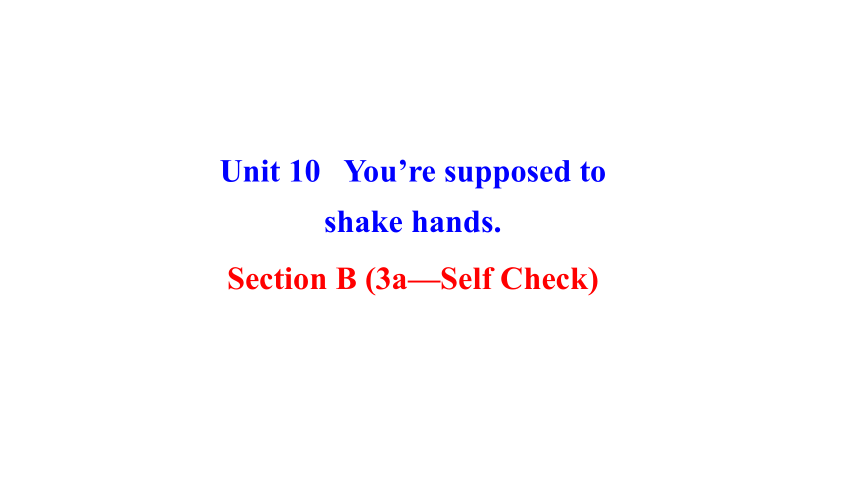 | |
| 格式 | ppt | ||
| 文件大小 | 320.0KB | ||
| 资源类型 | 教案 | ||
| 版本资源 | 人教新目标(Go for it)版 | ||
| 科目 | 英语 | ||
| 更新时间 | 2024-07-11 14:16:26 | ||
图片预览

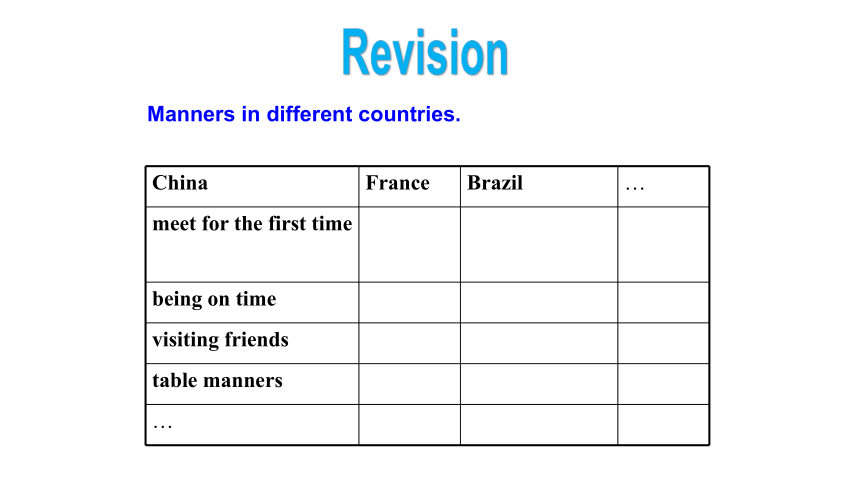
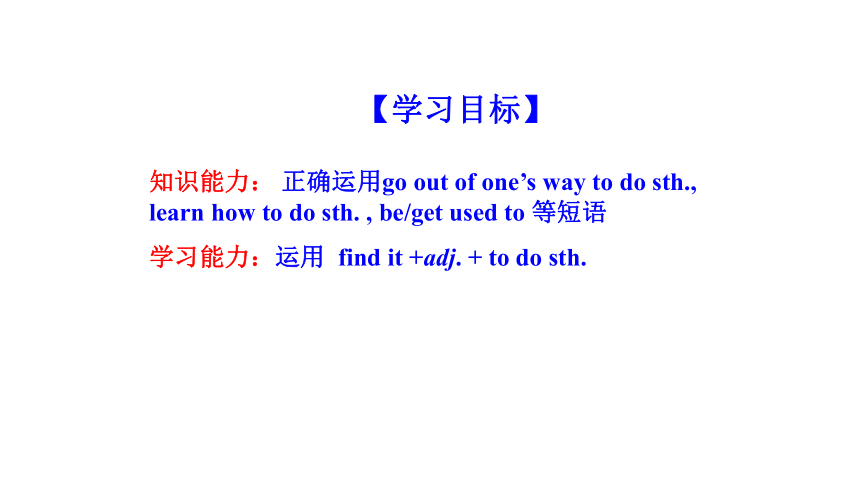
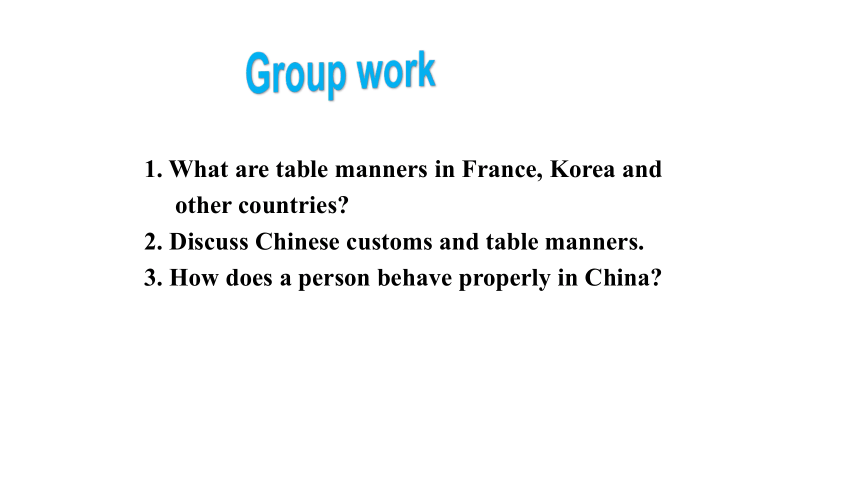
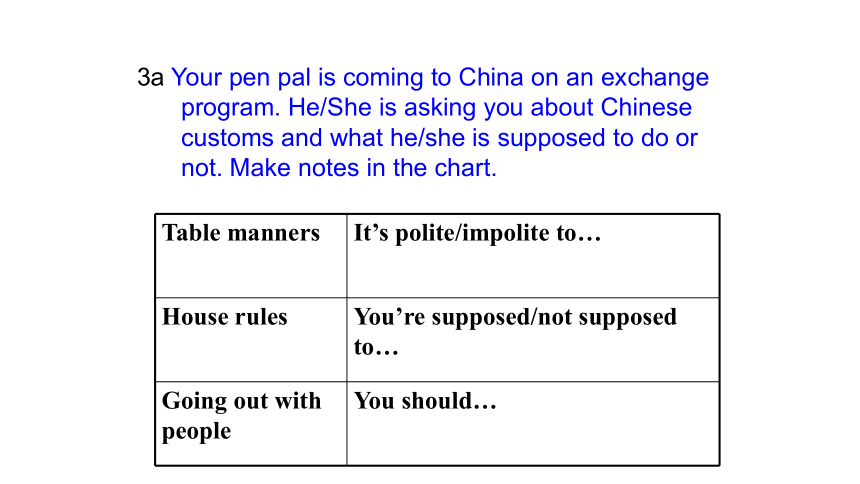
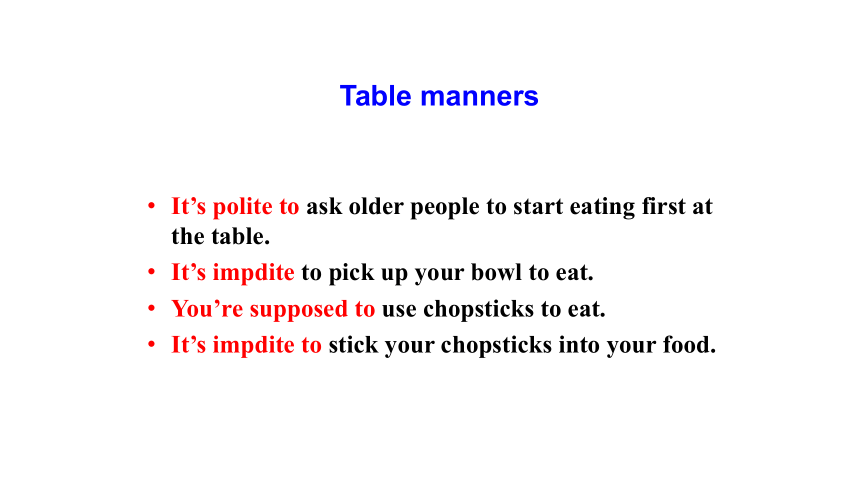
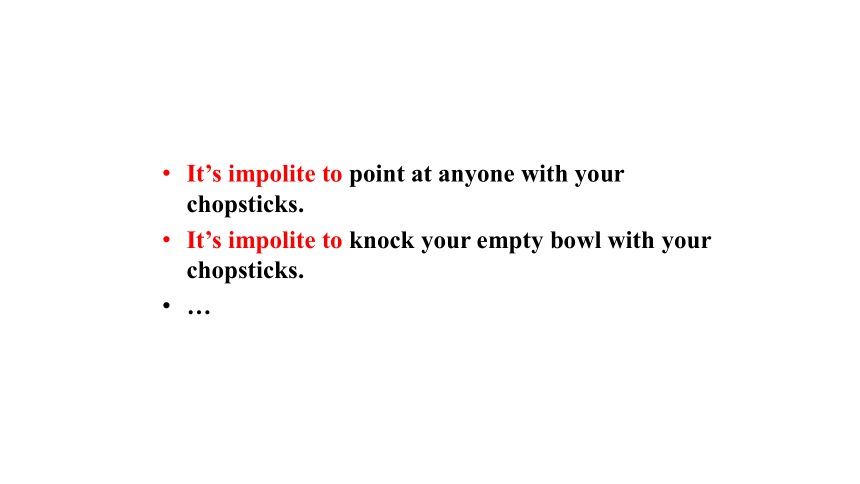
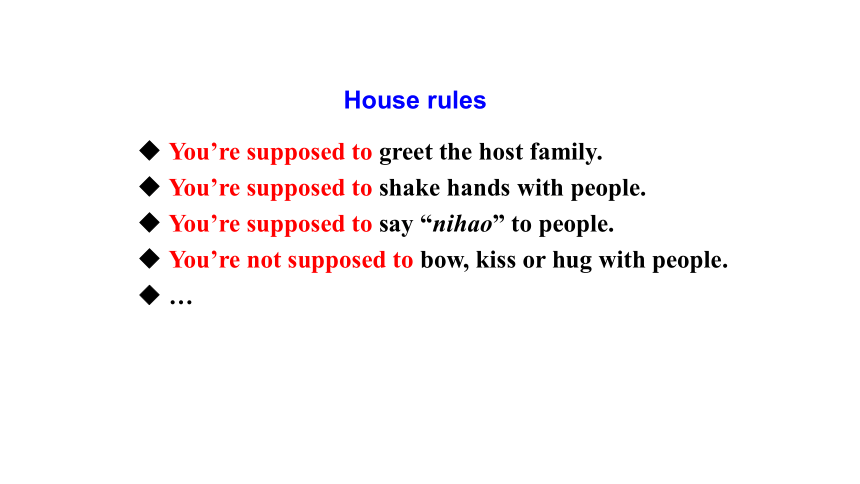
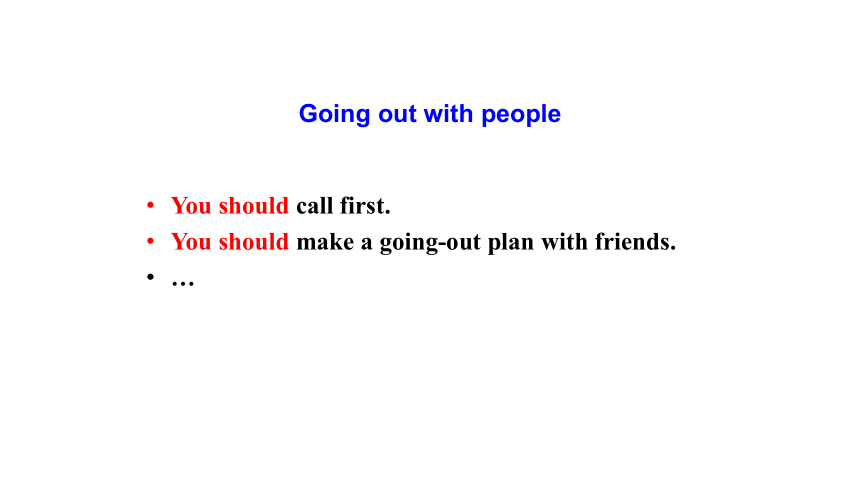
文档简介
(共26张PPT)
Unit 10 You’re supposed to shake hands.
Section B (3a—Self Check)
Manners in different countries.
China France Brazil …
meet for the first time
being on time
visiting friends
table manners
…
知识能力: 正确运用go out of one’s way to do sth., learn how to do sth. , be/get used to 等短语
学习能力:运用 find it +adj. + to do sth.
【学习目标】
1. What are table manners in France, Korea and other countries
2. Discuss Chinese customs and table manners.
3. How does a person behave properly in China
Table manners It’s polite/impolite to…
House rules You’re supposed/not supposed to…
Going out with people You should…
3a Your pen pal is coming to China on an exchange program. He/She is asking you about Chinese customs and what he/she is supposed to do or not. Make notes in the chart.
Table manners
It’s polite to ask older people to start eating first at the table.
It’s impdite to pick up your bowl to eat.
You’re supposed to use chopsticks to eat.
It’s impdite to stick your chopsticks into your food.
It’s impolite to point at anyone with your chopsticks.
It’s impolite to knock your empty bowl with your chopsticks.
…
◆ You’re supposed to greet the host family.
◆ You’re supposed to shake hands with people.
◆ You’re supposed to say “nihao” to people.
◆ You’re not supposed to bow, kiss or hug with people.
◆ …
House rules
You should call first.
You should make a going-out plan with friends.
…
Going out with people
3b Write a letter to your pen pal to give him/her advice and suggestions on how to behave properly in China.
Writing
写作技巧点拨:
1) 英语书信的写法:
称呼Dear…, 左起顶格写。
正文换行,也要顶格写,是信的核心部分。因此要求正文层次分明、简单易懂。
祝福的话语, 正文下换行,顶格写, 如: Best wishes! Take care! Happy New Year! Happy Birthday! 等。
结束语在正文下面的一、二行处,第一个词开头要大写,句末用逗号。结束语的写法 Yours, Your loving…, Sincerely yours,Yours sincerely或Sincerely;在结尾语下面的署名必须亲自签名,也不加任何的标点符号。
2) Useful expressions:
有关文化礼仪的写作常用句型
You’re (not) supposed to….
You are expected to…
It’s polite/impolite to…
It’s important to…
You should….
Sample writing
Dear Tony,
You must be excited about coming to China soon. Let me give you some suggestions and advice about Chinese customs. When you are eating at the table, it’s impolite to stick your chopsticks into your food. You are not supposed to point at anyone with your chopsticks.
In our house, you’re supposed to shake hands with my father for the first time. You are not supposed to kiss when you meet my mother. You can say “nihao” to her with a big smile.
When you go out with people, you are expected to call first, it’s important to make plans to do something interesting or go somewhere together.
Have a safe trip, and I look forward to meeting you soon!
Best wishes,
Lin Jie
1. Fill in the blanks with the words in the box.
Self Check
worth capital basic traffic
empty mad knocking
1. In many countries, it is impolite to show up at someone’s house for the first time with ______ hands. You should always bring a small gift.
2. Billy was very uncomfortable at a fine-dining restaurant last night because he didn’t know ______ table manners.
worth capital basic traffic
empty mad knocking
empty
basic
3. It is _______ spending the time to learn about the customs of a country before you go there. That way, you will know what you are supposed to do in different situations.
4. The ______ is always the worst in the ________ city. It is important to leave earlier if you are traveling by car.
worth capital basic traffic
empty mad knocking
traffic
capital
worth
5. Sandy went into her sister’s room without _________ on the door. That made her sister ______.
worth capital basic traffic
empty mad knocking
knocking
mad
词汇
1. shake hands 握手
2. drop by 顺便访问;随便进入
3. table manners 餐桌礼仪
4. make...feel at home 使(某人)感到宾至如归
5. make an effort 作出努力
【探究·导学】
句型
1. You are (not) supposed/ expected to...
你(不)应该……
2. You should/ shouldn’t... 你应该/不应该……
3. You can/can’t... 你能/不能……
4. It is + adj. + to do sth. 做某事是……的
【课堂小结】
本单元以“风俗礼仪”为话题,学习了不同国家的习俗和礼仪,如见面礼仪、餐桌礼仪等,谈论了在不同的场合应该怎么做。具体到书面表达中,要求同学们学会写有关“customs, habits, manners”方面的作文,重点掌握“be supposed/
expected to do”和“It is+adj.+to do sth.”句型。
1. You are ___________ (suppose) to shake hands when you meet a Chinese friend.
2. A knife is ______ (use) for _______ (cut) things.
1.用所给单词的适当形式填空
supposed
used
cutting
【训练·评价】
3. We Chinese eat with chopsticks, while the westerners eat with _______ (knife) and forks.
4. On weekends I feel completely __________ (relax).
5. It’s _________ (polite) to make a big noise in the school library.
knives
relaxed
impolite
Man is safe with courtesy, but dangerous with rudeness.
人有礼则安,无礼则危。
Unit 10 You’re supposed to shake hands.
Section B (3a—Self Check)
Manners in different countries.
China France Brazil …
meet for the first time
being on time
visiting friends
table manners
…
知识能力: 正确运用go out of one’s way to do sth., learn how to do sth. , be/get used to 等短语
学习能力:运用 find it +adj. + to do sth.
【学习目标】
1. What are table manners in France, Korea and other countries
2. Discuss Chinese customs and table manners.
3. How does a person behave properly in China
Table manners It’s polite/impolite to…
House rules You’re supposed/not supposed to…
Going out with people You should…
3a Your pen pal is coming to China on an exchange program. He/She is asking you about Chinese customs and what he/she is supposed to do or not. Make notes in the chart.
Table manners
It’s polite to ask older people to start eating first at the table.
It’s impdite to pick up your bowl to eat.
You’re supposed to use chopsticks to eat.
It’s impdite to stick your chopsticks into your food.
It’s impolite to point at anyone with your chopsticks.
It’s impolite to knock your empty bowl with your chopsticks.
…
◆ You’re supposed to greet the host family.
◆ You’re supposed to shake hands with people.
◆ You’re supposed to say “nihao” to people.
◆ You’re not supposed to bow, kiss or hug with people.
◆ …
House rules
You should call first.
You should make a going-out plan with friends.
…
Going out with people
3b Write a letter to your pen pal to give him/her advice and suggestions on how to behave properly in China.
Writing
写作技巧点拨:
1) 英语书信的写法:
称呼Dear…, 左起顶格写。
正文换行,也要顶格写,是信的核心部分。因此要求正文层次分明、简单易懂。
祝福的话语, 正文下换行,顶格写, 如: Best wishes! Take care! Happy New Year! Happy Birthday! 等。
结束语在正文下面的一、二行处,第一个词开头要大写,句末用逗号。结束语的写法 Yours, Your loving…, Sincerely yours,Yours sincerely或Sincerely;在结尾语下面的署名必须亲自签名,也不加任何的标点符号。
2) Useful expressions:
有关文化礼仪的写作常用句型
You’re (not) supposed to….
You are expected to…
It’s polite/impolite to…
It’s important to…
You should….
Sample writing
Dear Tony,
You must be excited about coming to China soon. Let me give you some suggestions and advice about Chinese customs. When you are eating at the table, it’s impolite to stick your chopsticks into your food. You are not supposed to point at anyone with your chopsticks.
In our house, you’re supposed to shake hands with my father for the first time. You are not supposed to kiss when you meet my mother. You can say “nihao” to her with a big smile.
When you go out with people, you are expected to call first, it’s important to make plans to do something interesting or go somewhere together.
Have a safe trip, and I look forward to meeting you soon!
Best wishes,
Lin Jie
1. Fill in the blanks with the words in the box.
Self Check
worth capital basic traffic
empty mad knocking
1. In many countries, it is impolite to show up at someone’s house for the first time with ______ hands. You should always bring a small gift.
2. Billy was very uncomfortable at a fine-dining restaurant last night because he didn’t know ______ table manners.
worth capital basic traffic
empty mad knocking
empty
basic
3. It is _______ spending the time to learn about the customs of a country before you go there. That way, you will know what you are supposed to do in different situations.
4. The ______ is always the worst in the ________ city. It is important to leave earlier if you are traveling by car.
worth capital basic traffic
empty mad knocking
traffic
capital
worth
5. Sandy went into her sister’s room without _________ on the door. That made her sister ______.
worth capital basic traffic
empty mad knocking
knocking
mad
词汇
1. shake hands 握手
2. drop by 顺便访问;随便进入
3. table manners 餐桌礼仪
4. make...feel at home 使(某人)感到宾至如归
5. make an effort 作出努力
【探究·导学】
句型
1. You are (not) supposed/ expected to...
你(不)应该……
2. You should/ shouldn’t... 你应该/不应该……
3. You can/can’t... 你能/不能……
4. It is + adj. + to do sth. 做某事是……的
【课堂小结】
本单元以“风俗礼仪”为话题,学习了不同国家的习俗和礼仪,如见面礼仪、餐桌礼仪等,谈论了在不同的场合应该怎么做。具体到书面表达中,要求同学们学会写有关“customs, habits, manners”方面的作文,重点掌握“be supposed/
expected to do”和“It is+adj.+to do sth.”句型。
1. You are ___________ (suppose) to shake hands when you meet a Chinese friend.
2. A knife is ______ (use) for _______ (cut) things.
1.用所给单词的适当形式填空
supposed
used
cutting
【训练·评价】
3. We Chinese eat with chopsticks, while the westerners eat with _______ (knife) and forks.
4. On weekends I feel completely __________ (relax).
5. It’s _________ (polite) to make a big noise in the school library.
knives
relaxed
impolite
Man is safe with courtesy, but dangerous with rudeness.
人有礼则安,无礼则危。
同课章节目录
- Unit 1 How can we become good learners.
- Section A
- Section B
- Unit 2 I think that mooncakes are delicious!
- Section A
- Section B
- Unit 3 Could you please tell me where the restroom
- Section A
- Section B
- Unit 4 I used to be afraid of the dark.
- Section A
- Section B
- Unit 5 What are the shirts made of?
- Section A
- Section B
- Review of Units 1-5
- Unit 6 When was it invented?
- Section A
- Section B
- Unit 7 Teenagers should be allowed to choose their
- Section A
- Section B
- Unit 8 It must belong to Carla.
- Section A
- Section B
- Unit 9 I like music that I can dance to.
- Section A
- Section B
- Unit 10 You're supposed to shake hands.
- Section A
- Section B
- Review of Units 6-10
- Unit 11 Sad movies make me cry.
- Section A
- Section B
- Unit 12 Life is full of the unexpected
- Section A
- Section B
- Unit 13 We're trying to save the earth!
- Section A
- Section B
- Unit 14 I remember meeting all of you in Grade 7.
- Section A
- Section B
- Review of Units 11-14
